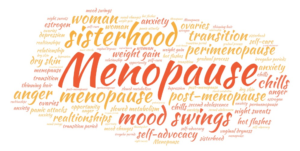Having hot flashes and night sweats? On a rollercoaster of emotions when you’ve always been the serene one? Noticing that your thinking is a little fuzzy and you’re having problems concentrating? Sounds like you might have started on the menopause journey, right? But when you speak with your healthcare providers, you’re told it’s just stress, or you’re too young for that to be the case. You’re even beginning to wonder yourself if you’ve made too much of these symptoms. That may leave you wondering if you’re going crazy or….if you’re experiencing medical gaslighting. The truth is:
They could be right.
And both of you could be right. After all, having one condition does not usually protect you from having other medical issues and concerns.
But you could be right, and they could be wrong.
What is medical gaslighting?
You may have heard the term medical gaslighting, but what does it really mean for your health?
Medical gaslighting is a situation in which a patient’s symptoms and concerns are dismissed or trivialized by a healthcare provider. For example, a patient may be told symptoms are due to stress or are viewed as “all in your head.” Or they may be ignored altogether.

Who is at increased risk of medical gaslighting?
As noted in the book, Navigating Your Healthcare Journey: Lessons Learned to Get the Care You Need and Deserve, of which pausitive health’s founder is a co-author, medical gaslighting is more common in communities of color, patients who are obese, those with mental health conditions or a disability, those with autoimmune conditions like chronic fatigue syndrome, and the LGBTQIA+ community. And it is more likely if a person belongs to more than one of these population groups.
Why does it happen?
There can be several reasons why you experience medical gaslighting, especially during menopause.
- Inadequate research and funding of research on women’s health.
- Differences in symptoms between men and women for the same condition.
- Insufficient diversity of the medical, academic, and research workforce.
- Inadequate medical training and expertise.
- Health inequity
Let’s walk through each of these reasons, as understanding the causes of medical gaslighting can help you learn how to combat it.
Or, you can jump ahead to how it can affect your menopause journey.
Women’s health research lags behind
When you go to the doctor looking for care, the medical guidelines and standards upon which that doctor often relies, are likely based on male research. Especially white men, and among them those who are younger.
That leads to insufficient research and understanding on women’s health issues. For example, these studies typically exclude pregnant women because of concerns about the impact to the mother and baby.
It was not until 2015 that the NIH took a stronger stance regarding the inclusion of sex as a variable in the majority of studies it funded!
Fast forward to the COVID-19 pandemic, and data collection and analysis were still less than optimal. The differences between men and women with COVID are well documented, with some women describing changes to their menstrual period. Women are also more likely to experience long COVID. Yet, the studies are less than comprehensive.
The end result? Insufficient knowledge and understanding of (1) conditions specific to the female sex and (2) those conditions with a greater prevalence in women than men.
For example, for years the symptoms of women with chronic fatigue syndrome (CFS) were not taken seriously, as was also the case with fibromyalgia, a chronic pain syndrome. Not infrequently, women were often told to “just learn to live with it” or were labeled hypochondriacs and advised to seek psychiatric care.
Men and women can have different symptoms for the same problem
Without adequate research and without a representative workforce (which we’ll get to in a minute), it creates problems for specific health conditions for which men and women can have different symptoms for the same problem.
For example, heart attacks kill more women than men, and there’s a cardiovascular risk component to menopause.
Although chest pain is the most common symptom of a heart attack, regardless of biological sex, women may experience different symptoms. In addition to chest pain, jaw pain, “elephant on the chest,” and shortness of breath are common symptoms.
However, women may experience:
- dizziness
- nausea and vomiting
- heartburn
- unusual and unexplained fatigue
Consequently, a woman may show up in the ER experiencing a heart attack and be discharged with a GI or other non-cardiac diagnosis.
The consequences can be fatal.
Medical and research workforce is not diverse enough
When you go to the doctor, do you see physicians who look like you?
Women of color often struggle to find a physician who looks like them and with whom some may feel more comfortable. That’s because the healthcare workforce lacks sufficient diversity.
According to Zippia’s 2022 analysis there were 55,501 physicians in the U.S. The racial/ethnic breakout is:
- 65.6% white (65.6%)
- 18.1% Asian
- 8.9% Hispanic/Latino
- 4.7% Black/African American
And of additional note, Black/African American physicians, on average, earn the least of all racial/ethnic groups.
6.3% of medical students identified as LGBTQ in an analysis of self-reported data by the Association of American Medical Colleges (AAMC) in 2021, and 3.1% of physicians reported having a disability in another AAMC study.
And when it comes to scientific researchers, 43.1% are women. The overall race/ethnicity breakout inclusive of both sexes is 56.3% white, 26.8% Asian, 8.6% Hispanic/Latino, and 5.5% Black/ African American.
Inadequate medical training and expertise
At pausitive health, we recognize your doctor may not ask or inform you of all the treatment options during menopause. In some ways, you may be your best medical advocate until you find a doctor who has expertise in the management of menopause.
That’s because several studies, including one by Johns Hopkins, have reported that medical school curricula and residency training leave many physicians ill-prepared or feeling uncomfortable about managing menopause.
A 2020 report by the Commonwealth Fund, “ Transforming Primary Health Care for Women,” indicated “only 20% of OB/GYN residencies offer training on the menopause journey, and 80% of medical residents report feeling ‘barely comfortable’ discussing or treating menopause.”
Health inequity
The CDC defines healthy equity as “the state in which everyone has a fair and just opportunity to attain their highest level of health.”
Components of health equity include:
- health disparities
- social determinants of health (SDOH)
- health literacy
- cultural sensitivity, humility, and competency
These factors are now well known to be important to clinical and scientific research. However, the data analysis that is performed, and the conclusions drawn from it, have frequently not taken these factors into account.
When there’s a lack or major gaps in an understanding of each of these factors, health inequity can result.
In turn, health inequity has a major impact on health and well-being, how and when conditions may manifest, the speed with which a diagnosis is considered and made, access to care, and the resources that support the ability to live a healthy lifestyle.

How medical gaslighting can affect women+ during menopause
There are several potential negative consequences of medical gaslighting. Among them is a more difficult menopause journey, including five ways the actions of healthcare providers can create avoidable challenges and a difficult patient experience at a vulnerable time.
1. Doctors may overlook menopause symptoms or delay treatment.
2. Medical costs may increase.
3. You may experience anxiety or stress.
4. You may suffer in silence.
5. Menopause taboos and stigmas are reinforced.
Delayed diagnosis and treatment
While many of the symptoms of the menopause journey are common – sleep issues, aches and pains known as the musculoskeletal syndrome of menopause, palpitations, irregular periods, weight gain, abdominal pain, and headaches – a woman may be told it’s “just PMS” or the result of stress, with no consideration of perimenopause as a possibility. That happens even if these symptoms are accompanied by an occasional hot flash or mild night sweats.
Researchers are still discovering the ways the hormonal shift impacts the body, with the musculoskeletal syndrome of menopause just becoming a named condition in 2024. It refers to the impact dropping estrogen can have on a woman’s muscles and joints.
The chance of that situation unfolding is greater for women who are at increased risk for premature (onset prior to age 40) or early (onset at age 40 or older but before age 45) menopause. A delayed diagnosis of either of these scenarios may result in delayed treatment (typically HT) that, in turn, increases the risk of chronic conditions like cardiovascular disease and osteoporosis at an earlier age than would typically be seen.
A 2022 study found that women (and people of color) waited 29% longer than men, independent of symptoms, to be seen in the emergency room when they presented with chest pain. They were also less likely to have an EKG ordered or be admitted for observation or as an inpatient.
Given that heart disease is the number one cause of death in women+ and that the risk of heart disease increases during the menopause journey as a result of the hormonal changes, you can see how catastrophic such a scenario could be.
2. Medical costs for care may go up.
You may incur a greater cost of care unnecessarily, which impacts out-of-pocket expenses and your financial well-being.
Let’s say you go to the doctor for one of the more uncommon symptoms and signs of menopause. Some of these more uncommon symptoms include new/different body odor, burning tongue, dry and itchy skin, cold flashes, a sensation of insects crawling beneath the skin, and leg pain. If you describe these symptoms to a doctor, you may be told you have a mental health problem.
And while that could be a cause, coming to that conclusion immediately without exploring other possibilities may delay effective treatment and result in a woman embarking on another type of journey – one to find answers.
As a result, a shotgun approach to a medical work-up may unfold. In turn, there may be multiple visits and procedures. Consequently, significant medical expenses can accumulate, particularly if you do not have health insurance or have insufficient coverage. (And, as discussed in Navigating Your Healthcare Journey: Lessons Learned to Get the Care You Need and Deserve, medical expenses are among the top five causes of personal bankruptcy in the U.S.)
3. You may experience stress, depression, or anxiety.
How does it make you feel when your symptoms are ignored or dismissed altogether? Especially by someone you thought you could trust, your healthcare practitioner!
The likelihood of having that type of encounter is greater for women of color and members of the LGBTQIA+ community.
Do you get stressed, depressed, or anxious?
Carrying that additional mental health burden can exacerbate the emotional distress the hormonal changes of the menopause transition itself can bring, e.g., anxiety, depression, and mood swings. And emotional turmoil can contribute to the severity of menopause symptoms.
Additionally, there may be negative impacts on the ability to live the very lifestyle that can make menopause symptoms less severe and easier to manage:
- Stress can lead to “stress eating” that contributes to weight gain as well as cravings for high-fat, high-calorie, high-carb foods, which can increase inflammation in the body and consequently increase the risk of cardiovascular disease. Stress impacts the body in many ways and can make menopausal symptoms worse, so develop coping strategies.
- Depression can lead to reduced physical activity levels and sleep issues, which in turn can contribute to weight gain and fatigue. Those with depression may also experience aches and pains, anxiety, irritability, and anger, as well as problems with focus and concentration, which can worsen the symptoms of brain fog.
- Anxiety, which may develop as a result of the drop in estrogen levels during the menopause journey, can lead to depression and also show up in symptoms like palpitations, sleep issues, irritability, GI distress, sweating, and difficulty focusing or concentrating.
Also, being stressed, depressed, or anxious can make it more difficult to manage your symptoms.
4. You may suffer in silence, needlessly.
As a result of medical gaslighting, women+ may be reluctant to ask questions or bring up their concerns during visits with their PCP or OB-GYN and instead suffer in silence. They may conclude they are the only ones experiencing “weird and unexplained” symptoms, which then cause concern, worry, fears of having dementia or cancer, or thoughts that they are “going crazy.”
The possible consequence? You may develop mistrust or have some of your worst fears regarding inequity in the healthcare system confirmed.
5. Menopause stigmas and taboos are reinforced.
In the U.S. and in many countries across the world, menopause has very negative connotations and societal messaging that communicates: this is a time of becoming old and haggard and a time to be “put out to pasture.”
In response, women may suffer needlessly and in silence, not even bringing up the concerns for which there are many treatment options.
Menopause will eventually happen to all who are biologically female if they live long enough. Does it really make any sense to write off more than half of the population?
Combating gaslighting
So, what can you do? Become as knowledgeable as possible. You’ve already taken this first step. It makes it more likely you’ll recognize it, if or when it happens.
Knowledge is power, so if you aren’t already well-versed in self-advocacy skills and being assertive when necessary, understanding the potential challenges you may face will help give you the confidence to make clear your expectations of equitable care.
Being aware of the possibility will also reduce the likelihood that you’ll doubt yourself.
Become a menopause expert
Although it may feel like you shouldn’t have to “study up,” no one has more to gain, or to lose, than you when it comes to your health and well-being. The more informed you are, the better position in which you will be to ask questions, find out what options might be available – both hormonal and non-hormonal, and to feel in more control of the situation.
Stick with information from reputable sources. On pausitive health’s “Learn” page, we have worked hard to provide information that has been vetted and supported by research and reputable organizations.
When doing research on the Internet, it’s easy to fall into a rabbit hole of inaccurate information or outright disinformation.
Below is some guidance from Navigating Your Healthcare Journey: Lessons Learned to Get the Care You Need and Deserve:
- First, note the source of the information. Websites such as “.gov” sites, and those maintained by healthcare institutions – hospitals, academic institutions, healthcare-related associations, and non-partisan healthcare foundations – are generally reliable sources.
- gov = a government-sponsored site
- .edu = an educational institution
- .org = usually a non-commercial organization, but some have a specific agenda and mission that may bias the content
- .com = a business or commercial organization
- MedlinePlus – sponsored by the National Library of Medicine [part of the National Institutes of Health (NIH)]
- Health.gov – sponsored by the Office of Disease Prevention and Health Promotion in the U.S. Department of Health and Human Services (HHS)
- CDC.gov – sponsored by the Center for Disease Control and Prevention
- NIH.gov – National Institute of Health
- FDA.gov – sponsored by the Food and Drug Administration
- National Center for Complementary and Integrative Health (NCCIH) – the Federal Government’s agency for scientific research on complementary and integrative health approaches
- PubMed® – contains information from scientific and medical journals
- Pay attention to the website address. Make sure the site has https noted in its url. HTTPS (Hypertext Transfer Protocol Secure) is an encryption protocol that secures communication and data transfer between a user’s web browser and a website. It will look like this – https:// – instead of this: http://
- It’s also possible that instead of https you will see an icon that looks like a locked padlock, indicating https is in place. While you are searching, you don’t want to open yourself up to an increased risk of a hack!
- Check to see if the site provides a way to make contact. It should also clearly state its terms and conditions of use.”
Prepare for doctor’s appointments
Going to see the doctor can often make you feel anxious or nervous, especially if you aren’t sure of what’s going on or have imagined the worst.
1. Make a list of your questions to avoid forgetting things that have really been worrying you. Some basic ones would include:
- What is my diagnosis? What do you think it might be?
- Will I need a work-up before you can determine what the problem is?
- If so, what will the work-up entail?
- What are my treatment options? What are the pros and cons of each?
- Do you have resources or recommendations about where I can look to learn more?
- If medication is prescribed:
- How long should it take to work?
- What are the potential side effects?
- What side effects should I call you about?
- Will the side effects eventually go away?
- Is there another medication I can take instead?
- Are there any issues with taking this medication with my other prescription meds, any OTC meds, or herbal medicine which I take?
2. Bring a list of any medications you are taking, including OTC, herbal medicine, and supplements.
3. Whenever possible, find out as much as you can about your family history in as much detail as possible. The risk of having premature or early menopause is more common if you have a mother, sister, aunt, or grandmother who had it. And for many women, the type of symptoms they have going through the menopause transition are similar to those experienced by their mother.
4. Confirm the preventive care services (for both your physical and mental health) you need with your healthcare provider. Find out if additional evaluations or recommendations are indicated in your particular situation based on factors like family history, gender/sexual orientation, profession, and workplace exposures to potential toxins.
5. Seek care from those with the training and expertise best suited to your specific needs and health status. In addition, make sure you have a primary care practitioner you trust and with whom you can be open and honest). For example, if you have inflammatory bowel disease (ulcerative colitis and Crohn’s disease), a gastroenterologist would be a member of your care team.
If you are a member of the LGBTQIA+ community, try to find someone who is welcoming, non-judgmental, and trained in providing care. They need to be attuned to issues for which there is greater risk in the queer community (e.g., suicide, depression, anxiety, obesity, and breast cancer) can make all the difference.
As we’ve discussed, don’t be surprised if your doctor, that you’ve had for years, is not the best fit for your menopause journey.
During the menopause journey, it’s key to find a clinician with the interest, training/expertise, and comfort level needed to manage menopause and treatments like HT.
If you’ve ever known parents with a child with cancer or a rare condition or been one yourself, you have seen the degree to which they fight to get the care their child needs. They become experts on the condition, ask questions until they get answers, ask more questions to make sure they understand, and stay steadfast in their pursuit of a solution.
When fighting for the health and care of a loved one, we’re often the fierce advocates we might not be for ourselves in the same situation. If standing up for yourself when navigating the healthcare system does not come naturally, the potential of being the subject of medical gaslighting and its repercussions is an important reason to dig deep to gain the self-advocacy skills and confidence to combat it.

You DO have power!
Medical gaslighting is an unfortunate, longstanding reality in the healthcare system.
Hopefully, over time the associated behaviors will be addressed through actions like provider training in cultural sensitivity, humility, and competency and including the topic of the menopause journey will be a standard operating procedure when it comes to the curriculum in medical school and residency and fellowship training programs.
You are responsible to yourself, to love yourself, to care for yourself, and to help yourself.
~ Akiroq Brost
In the meantime, there are steps that can be taken to speed things along:
- The segments of the population most likely to experience medical gaslighting, and those who love them, can contribute to the dismantling of a destructive pattern which has far-reaching negative consequences for health and well-being, and which can sometimes rise to the level of being life-threatening. Collectively, they can raise their voices and increase the awareness necessary to bring the degree of attention on this issue that drives change.
- At the individual person level as you navigate your healthcare journey, you can become an informed patient and advocate for yourself to get the care you need and deserve.
Change often begins person-by-person. It can serve as the “starter yeast” to create the conditions that transform society’s view of what is considered a basic standard of care for ALL.
The menopause transition is often a stage in life when those going through it also begin a journey of self-reflection and look into the future to what lies ahead to create the life they would like to live. What better time to invest in yourself and your health and well-being?
You DO have power!
Take the time now to exercise it.
The life you save could indeed be your own.
Why medicine often has dangerous side effects for women | TEDxProvidence
Consideration of Sex as a Biological Variable in NIH-funded Research | NIH
The single biggest health threat women face | TEDxWomen 2011
What happens when you have a disease doctors can’t diagnose | TEDSummit
From heart disease to IUDs: How doctors dismiss women’s pain | The Washington Post
Women more likely to die after heart attack than men | European Society of Cardiology
Doctor Demographics and Statistics in the U.S. | Zippia
Mori WS, Gao Y, Linos E, et al. Sexual Orientation Diversity and Specialty Choice Among Graduating Allopathic Medical Students in the United States. JAMA Netw Open. 2021;4(9):e2126983. doi:10.1001/jamanetworkopen.2021.26983
Scientist Demographics and Statistics in the US | Zippia
What do Ob/Gyns in training learn about menopause? Not nearly enough, new study suggests | Medical Xpress
Transforming Primary Health Care for Women – Part 1: A Framework for Addressing Gaps and Barriers | The Commonwealth Fund
A Prescription for Health Equity | PeopleTweaker
COVID-19 Underscores Health Disparities Long Entrenched in Medical History | PeopleTweaker
How to Holistically Address SDOH to Improve Outcomes | PeopleTweaker
How to Improve Healthcare Well-Being Through Health Literacy | PeopleTweaker
7 Ways Cultural Competency Increases Health Equity | PeopleTweaker
Sex and Race Differences in the Evaluation and Treatment of Young Adults Presenting to the Emergency Department with Chest Pain | Journal of the American Heart Association
20 Questions to Ask Your Doctor | Navigating Your Healthcare Journey
Home | Navigating Your Healthcare Journey
MedLine Plus | National Library of Medicine, National Institutes of Health (NIH)
Home | Office of Disease Prevention and Health Promotion in the U.S. Department of Health and Human Services (HHS)
Home | Centers for Disease Control and Prevention
Home | National Institute of Health
Home | Food and Drug Administration
Home | National Center for Complementary and Integrative Health (NCCIH)
Home | PubMed®
Well-Woman Chart | Women’s Preventive Services Initiative
Find LGBTQ+ friendly healthcare near you | LGBTQ+ Healthcare Directory
Find a Menopause Practitioner | The Menopause Society
You may also like…

A Black Woman’s Prescription for Health: How To Navigate Health Disparities
Are you experiencing more menopause symptoms than your white friends or colleagues? Research backs up this experience. Learn about black woman’s health during menopause.

Why Your Doctor Might Not Be Well-Informed About Menopause And How To Take Action
Has your doctor asked you menopause? Learn why your doctor may not be well-informed and how you can find a menopause doctor.

Menopause Stages: Signs And Symptoms Of This Natural Stage Of Life
There are several menopause stages, and each brings its own set of symptoms. Learn the signs of menopause, and how to manage the journey.

